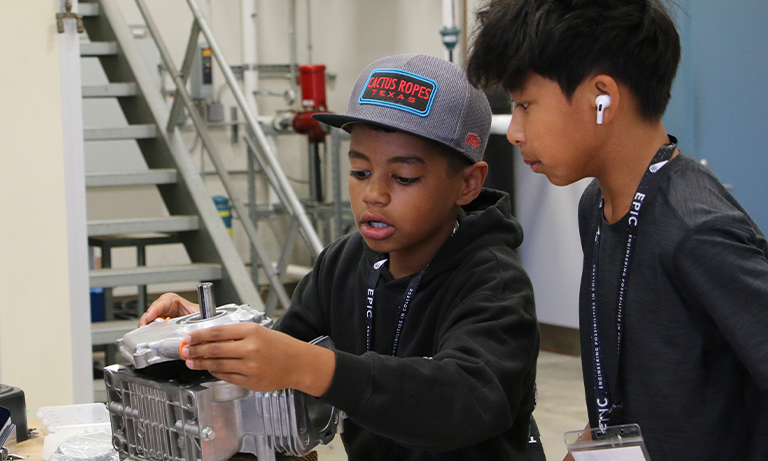Three years after graduating from Cal Poly, Jen Overgaag quit her job at Cisco Systems and embarked on an international backpacking trip that would change her life.

“I am deeply grateful for my time at Cisco – it truly set me up for success in my career by giving me access to an incredible amount of training and field experience,” she said. “As time went on, I realized that the work I was doing was not having an impact on the people in the world who needed the most help and whom I most wanted to help.”
Years earlier, her journey began in a much different setting – an “extremely small town” in Wyoming, where computer classes were limited to independent study.
“The teacher in this class noticed that I had a gift for technical work and suggested that I look into studying in a computing field,” she said.
She eventually went to Cal Poly, graduating with a computer engineering degree in 2006. After college, she landed a job as a systems engineer at Cisco, a desirable landing for tech grads. But, as Cisco provided her with valuable career tools, she began to reconsider her goals. Unsure what type of career would best position her to help others, she left the country for 18 months, stopping in Western Europe, Eastern Europe and, as her savings began to dwindle, Africa.
“I eventually ended up volunteering with a school in Zambia when someone in my network heard about my career goals and connected me with the principal at the school,” she said. “It was during my time at this school that I realized how I could use my skills and education to make a huge difference in people’s lives.”
While working as a technology volunteer, she noticed that students with internet access were more engaged with their education and had more ambitious education goals.
“This is how I realized the power that technology has to drive development in some areas of the world,” she said. “I came back to the U.S. with a goal to find an organization that was focused on using technology to provide access to information which in turn would help drive development.”

Once she returned to the United States, she became a project engineer with Inveneo, whose mission is to get the tools of information communications technology — such as computers, phones, and internet access — to people and organizations in rural and highly underserved communities of the developing world. Two years later, she founded BANJO Networks, a consulting business that specializes in rapid communications network deployment in response to disasters and sustainable technology solutions in diverse and challenging environments. In that role, she spent considerable time in Haiti, which suffered a devastating earthquake, the typhoon-stricken Philippines, and Puerto Rico after Hurricane Maria.
After a disaster, Overgaag said, communications are needed for hospitals, municipalities, and police; non-governmental organizations trying to provide relief; and families attempting to connect with loved ones.
As she helped facilitate those communications, reactions to disasters – neighbors helping neighbors get food and water, clearing streets for supply trucks or helping each other find relatives — offered a renewed sense of faith in humanity.
“Aside from the obvious grief, chaos and destruction, the sense of community is what I have noticed stands out the most in the environment following a disaster,” she said. “I am constantly impressed at how people show up for their community.”
Overgaag, who volunteers on the Computer Engineering Industry Advisory Board, still assists communities through BANJO Networks. And since September 2020, she has worked as a software engineer for Recidiviz, a nonprofit focused on accelerating progress toward a smaller, more fair criminal justice system.
“We use data shared with us from the departments of corrections within our partner states,” she said. “This data allows us to provide open-source tools for real-time monitoring and analysis, standardizing metrics across national, state and local jurisdictions, and create tools that enable outcome-based decision making.”
A dancer and “creative reuse” artist, Overgaag also promotes creative thinking with tech. While disinformation campaigns have cast a shadow on social media platforms, Overgaag thinks tech’s overall impact on society is positive – whether it’s addressing wider challenges, such as climate change, or smaller ones that impact a handful of people.
“Change can be messy, and we are in the middle of a digital revolution,” she said. “I have very high hopes that on the other side of this revolution, we will be a more just, equitable, healthy, and sustainable society.”


